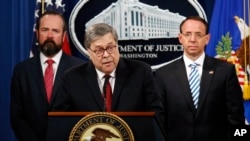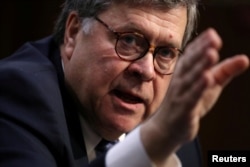Special counsel Robert Mueller's report on his investigation into Russian meddling in the 2016 U.S. election released on Thursday indicates that President Donald Trump sought to force Mueller's removal.
The redacted version of the more than 400 page report released by Attorney General William Barr said that in June of 2017, Trump directed White House Counsel Don McGahn to tell him Mueller must be dismissed due to conflicts of interest.
"McGahn did not carry out the direction, however, deciding that he would resign rather than trigger what he regarded as a potential Saturday Night Massacre," the report said. The Saturday Night Massacre refers to President Richard Nixon's firing of key law enforcement officials in October 1973 during the Watergate era.
Shortly before the report went public,Barr told reporters it exonerates President Trump of colluding with Moscow and said that later, after assuming power, Trump had "no corrupt intent" to obstruct the probe.
Barr said that when Trump took office in January 2017, he "faced an unprecedented situation" and was "frustrated and angered" at the outset "by a sincere belief that the investigation was undermining his presidency, propelled by his political opponents, and fueled by illegal leaks."
Yet Barr, a Trump appointee as the country's top law enforcement official, said the president "took no act that in fact deprived" Mueller of "documents and witnesses necessary to complete his investigation."
Barr concluded,"Apart from whether [Trump's] acts [as president] were obstructive, this evidence of non-corrupt motives weighs heavily against any allegation that the president had a corrupt intent to obstruct the investigation."
The attorney general said Trump's lawyers were shown an advance copy of the Mueller report in recent days but were not allowed to make any changes. He said the president's lawyers made no attempt to assert executive privilege about White House conversations to delete any material from the report.
Barr detailed extensive Russian interference in the U.S. election three years ago.
But Barr said Mueller "found no evidence that any Americans – including anyone associated with the Trump campaign – conspired or coordinated with the Russian government," either in a disinformation campaign through social media accounts in the U.S. aimed at helping Trump defeat his opponent, Democrat Hillary Clinton, or in the hacking of computers at the Democratic National Committee to steal and then release emails damaging to Clinton.
"After nearly two years of investigation, thousands of subpoenas, and hundreds of warrants and witness interviews, the special counsel confirmed that the Russian government sponsored efforts to illegally interfere with the 2016 presidential election but did not find that the Trump campaign or other Americans colluded in those schemes," Barr said.
An hour before Barr spoke, Trump launched an 11th hour attack on the Mueller report, calling his 22-month investigation "The Greatest Political Hoax of all time!" and in a second all-caps tweet claiming it was "PRESIDENTIAL HARASSMENT!"
As he often has, Trump contended that "crimes were committed" not by him, but by Clinton, other opposition Democrats and "Dirty Cops," his derogatory description of high-level law enforcement officials he claims were scheming to keep him from becoming the 45th U.S. president.
"You’ll see a lot of very strong things come out" in the report, Trump told a radio interviewer on Wednesday.
With the release of the report, Congress and the American people will for the first time see for themselves in detail what Mueller examined as he and his team of federal investigators and prosecutors worked to determine whether Trump's campaign or its associates worked with Russia to help him defeat Clinton, the former secretary of state.In addition, Mueller probed whether Trump sought to thwart the probe.
No decision on obstruction
Late last month, in a summary of Mueller's findings, Barr said the special counsel had concluded that Trump had not colluded with Russia, but reached no decision on whether he had obstructed justice. With Mueller not making a decision on the obstruction issue, Barr said he and Deputy Attorney General Rod Rosenstein decided that no obstruction charges against Trump were warranted.
Barr told reporters it was his prerogative to make the decision to not charge Trump.
Barr has redacted sensitive portions of the report that came from secret grand jury testimony or U.S. intelligence sources, but officials said the section on obstruction was only "lightly redacted," likely leaving a detailed examination of Trump's public tweets and the private actions he was suspected of taking to undermine the Mueller probe.
News accounts say that Mueller was stymied in deciding whether Trump obstructed justice because he could not always determine the intent of his remarks and actions after becoming president. Trump answered questions in writing during the investigation but did not face Mueller's prosecutors face to face, with Mueller and the White House unable to reach an agreement for Trump's live testimony.
Mueller's report said prosecutors didn't subpoena Trump because it would have created a "substantial delay" at a "late stage" in the investigation.It said the special counsel viewed Trump's written answers as "inadequate."
Opposition Democrats protested that Barr held the news conference before the report was made public, saying it was an attempt to spinMueller's findings into a favorable view of Trump's role.
House Speaker Nancy Pelosi and Senate Democratic leader Charles Schumer said in a statement they "believe the only way to begin restoring public trust in the handling" of the Mueller investigation was for Mueller himself to testify publicly before congressional panels "as soon as possible."
Moments after Barr finished speaking, House Judiciary Committee Chairman Jerrold Nadler called for Mueller to testify before his panel no later than May 23.
U.S. intelligence agencies in early 2017 assessed that Russia, at the direction of President Vladimir Putin, carried out a campaign to undermine the U.S. vote and had a clear preference for Trump to win.
The issues covered in the report are certain to endure in U.S. political discourse in the short-term, with Barr scheduled to testify before the Senate Judiciary Committee on May 1, followed by an appearance before the House Judiciary Committee the next day.
Looking to the longer-term, it is highly unlikely the investigation will fade to irrelevance before the next presidential election in November 2020.
In one measure of public demand for the information, several publishers are offering people the ability to purchase printed copies of the report, and pre-orders alone on Amazon's website ranked among its top 100 in book sales before the report was released.
What have long been public are the legal ramifications of Mueller's probe.
Five Trump campaign associates pleaded guilty or were convicted of a range of offenses and a sixth is awaiting trial, some for lying about their contacts with Russians during the 2016 campaign or just before he took office in January 2017 and some for offenses unrelated to Trump.
In addition, Mueller also charged 13 Russian nationals with trying to influence the 2016 election by tricking Americans into following fake social media accounts with material favorable to Trump and against his opponent, Clinton.Another dozen Russian military intelligence officers were charged with the theft of emails from Democrat Party officials. None of the Russians is ever likely to face a trial in the United States because the two countries do not have an extradition treaty.






